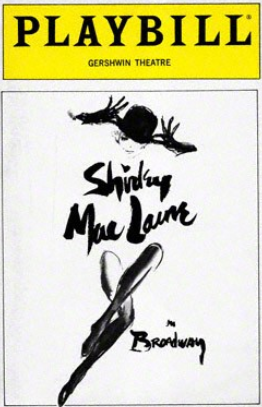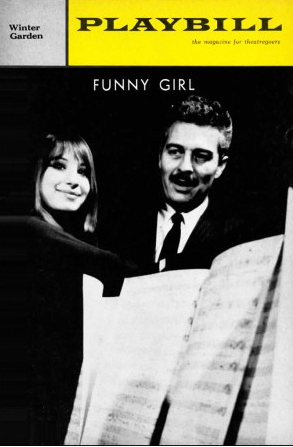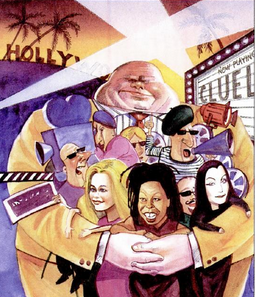The revelations of Scott Rudin’s highly abusive, toxic workplace practices continued to dominate the theatre news this week, with Vulture publishing an explosive account of some of his worst excesses towards 33 former assistants and interns they spoke to who worked for him between 1994 and 2020.
As Vulture tweeted,
This was an office where the advice given to newcomers was, “His phone cord is nine feet long. If you’re in his office, make sure you’re ten feet away, because then the phone won’t hit you.”
Words like psychopath often get banded about, but if he isn’t one, he’s certainly deeply, deeply damaged and damaging. We’ve previously already heard from the twin brother of one of his former assistants who committed suicide after working for him; this week he posted a video addressed to Rudin directly, to appeal to his conscience (assuming he has one).
But if victims have started to come forward; the industry itself has been slow to call out his practices and disassociate itself from him. Partly it’s about guilt — this stuff was widely known about, but nobody dared to call it out sooner.
Michael Chabon, who collaborated with him for over 20 years, published a mea culpa on Medium. As he writes,
“Twenty years is a long time to collaborate with an abuser. My impulse is to excuse, exonerate or at any rate minimize my complicity by saying that personally I never saw or heard anything approaching the level of the most egregious incidents reported on vulture.com and elsewhere, that I never heard Scott use vulgar or demeaning epithets, or saw Scott cause physical injury. I heard stories of Scott’s tantrums and vindictiveness, but not of smashed hands and people pushed out of moving cars.
But I knew enough. I regularly, even routinely, heard him treat his staff, from the new kid doing the coffee run to the guy just under Scott on the SRP organizational chart, with what I would call a careful, even surgical contempt, like a torturer trained to cause injuries that leave no visible marks.”
It’s a brave, honest and shaming piece: he also admits,
“lt’s not an excuse, or anything remotely like a justification, but I didn’t even break with Scott when, in 2010, he turned the fury, vitriol and vituperation against me, in a dispute over the terms of a deal, in a series of potent Rudin email bombs packed with nails, razor blades and personal insults. It wasn’t until some five years later, when he began — behind our backs — to demean and shit-talk my wife, that I finally drew a line, and resolved not to work with him again.
But it’s not enough to draw a line, however belatedly. You also have to point to it. You have to call people’s attention to it, and explain why it’s there, why you drew it. That’s another thing I did not have the courage or, to be completely honest, the inspiration or the vision, to do.”
But if he’s finally making a public amends, what about the others who are too scare to go there, because they themselves may be similarly guilty, if not quite at the extreme levels that Rudin exhibited. As with #MeToo, this could just be the tip of the iceberg. I can personally name two producers, both of whom work on both sides of the Atlantic, who are well-known for bullying behaviours.
But mainly the silence is about brutal self-interest: without Rudin, a lot of jobs could be on the line. That’s indeed the very excuse I was given for why one producer didn’t speak out; they were focused primarily, I was told, on making sure that people’s jobs were safe.
Rudin was very, very prolific. He made things happen. He made good things happen. But he made good things happen while doing bad things. Was it a price worth paying? Of course not.
But Broadway will, at least initially, be impoverished without him (until others inevitably fill the vacuum). He brought a lot of quality projects to Broadway, and was without doubt Broadway’s single most powerful independent producer, particularly of plays. He took a lot of risks on new ones. Who else would have brought Taylor Mac’s deeply eccentric Gary: A Sequel to Titus Andronicus to Broadway? And he provided lavish revivals of old ones, and not necessarily always of the most obvious titles, either. He’d package them with stars, like Elaine May in Kenneth Lonergan’s The Waverley Gallery, that made them essential viewing.
As theatre critic Charles McNulty wrote in the LA Times,
“His investments in writers, directors and designers have inarguably enriched this era of theater.
In a Broadway scene crowded with theme park shows, he showed that adventurous drama, old and new, could flourish in the commercial marketplace. He could make a classic like August Wilson’s Fences seem freshly minted in a revival that cast Denzel Washington and Viola Davis as the leads. He proved that Three Tall Women, Edward Albee’s off-Broadway Pulitzer Prize winner, wasn’t too downtown to work uptown, especially with Glenda Jackson and Laurie Metcalf on the marquee.
Rudin made my job infinitely more interesting by making space for new plays by Lucas Hnath (A Doll’s House, Part 2) and Stephen Karam (The Humans) and the auteur wizardry of Ivo van Hove (A View From the Bridge, The Crucible, West Side Story). For bringing Elaine May to Broadway in The Waverly Gallery, I’ll be forever grateful to Rudin.”
Like all of us, Rudin was a man of contradictions: he COULD be good, as well as bad. In a report in the New York Times yesterday, British producer Robert Fox, who was a long-time partner of his before they had a falling out and Rudin started working instead with Sonia Friedman as his UK partner, said:
“There’s always, with Scott, two sides to the coin, depending on what he wants. He can treat people impeccably well, or disgracefully badly, and there’s not much in between…. He’s super-bright, he’s incredibly motivated, he has really good taste, and he can be incredibly good company. But he’s also very controlling — and became more so as the years wore on — and I don’t believe anyone could put their hand up and say they weren’t aware that he treated his staff really badly. He’s a very volatile man. Very, very volatile.”
So can he, or will he, be rehabilitated after a period of “reflection” that he has promised he is going to undertake?
As the Hollywood Reporter wrote in a story published on Thursday,
“Amid fallout over abuse claims against the producer, two things are clear: More reports of bad behavior are likely to come, and many in Hollywood are nonetheless rooting for Rudin.
The silence is audible.
After The Hollywood Reporter’s April cover story reported claims of Scott Rudin’s abusive behavior, an agent who represents the sort of high-end talent who would be likely candidates to write, direct or appear in a Rudin production called with a question: How radioactive is he?
In other words, will clients suffer reputational damage if they do business with a man who has now been accused, on the record, of tormenting scores of assistants and others who worked with him over the years, including at least one allegation of physical assault?
That is the calculation underway for many who have worked with Rudin, 62, and answers are slow in coming.”
It quotes “a source who has been in touch with Rudin” who says he’s “genuinely sorry the talent will have to answer for him.” And as the story goes on to say,
“There’s good reason for that beyond whatever empathy he may be capable of mustering. Rudin knows where he’s vulnerable; if talent feels compelled to flee, that’s the final curtain.
At this point it seems that no reckoning is likely to come from various players in the business world. Nothing so far from WME, which has represented Rudin in television deals, and nothing publicly from A24, which has kept Rudin going in the movie business as the major studios have tired not only of his tantrums and demands but also of interesting art house material. As for volatile moguls David Geffen and longtime Rudin backer Barry Diller — the primary funders of the producer’s Broadway ventures — they wouldn’t call out bullying and are hardly in a position to do so.”
And there’s the rub. Let he who is not guilty cast the first stone. Few can. In the New York Times story yesterday, both men duly hedged their bets.
“I don’t condone, nor am I an apologist for, actions relating to his work in his personal office,” Mr. Diller said, adding that he thought that “separate and special consideration” should be given “to his work outside of that office.”
Mr. Geffen said that Mr. Rudin has “a psychological problem that he needs to deal with if he’s going to work in the future.”
And would Mr. Geffen work with him again?
“If his behavior didn’t change it would be an easy no,” Mr. Geffen said, but, he added, “I don’t think a death sentence is called for if he gets the help he needs and his behavior changes.”
This is the third consecutive Sunday that I’ve now written about him. And new stories emerge every single day. I suspect I’ll be cataloguing these stories for some weeks to come.
But the most alarming, apart from Vulture’s collection of stories, is a column a friend sent from a 1996 issue of Spy magazine (the illustration for which is pictured at the top of this column). That’s a full quarter of a century ago. He’s only 62 now; so he was just 36 then, with this fearsome reputation ALREADY.
Under a headline Jaws 5: The Great White Fat Guy, it reported stories of how this kind of craziness was his modus operandi even then:
“In the old days, porcine producer Scott Rudin ate wads of string cheese — served posthaste by one of his browbeaten brownnosers — between his steak lunch at Morton’s and his steak dinner at Morton’s. Now the tubby titan is watching his weight, gobbling Lean Cuisine meals and chasing them down with mineral water. But though Rudin may tread lighter on the scale, pound-for-pound he’s still the ‘Biggest Asshole in Hollywood.”…..
When not tossing things at people, Rudin likes to hurl office supplies. And anything else that’s handy, like video tapes, paper, even his Amtel machine, the obnoxious interoffice memo device that, like -mail, sends messages on-screen (His favourite request, pre-diet: ‘String cheese NOW!’)”
So it has taken over 25 years for him to finally be held accountable for this sort of behaviour, which only escalated in its severity in the intervening time. Why wasn’t there an intervention back in 1996? Where was the outrage then? And will happen now? Will the leopard finally (be forced to) change his spots? And will Hollywood and Broadway conveniently forget what happened before, and accept his penance?
Rudin himself told the New York Times yesterday (in a written response to questions, not an interview): “I am doing the work to become a better person and address my issues. Beyond that commitment, anything else would be far too early to contemplate.”
So he’s still hedging his bets. Watch this space…..
SUNDAY APRIL 18
My column today:
- The Seth Concert Series, with Stephanie J Block and husband Sebastian Arcelus:
- Scott Rudin commentary:
MONDAY APRIL 19
My column today:
- Quote of the day:
News of the day:
- Tell Me On a Sunday to launch new UK tour at Malvern Theatre, from June 15
TUESDAY APRIL 20
My column today:
News of the day:
- Priscilla Queen of the Desert – the Musical to launch new UK tour at Cheltenham’s Everyman, from June 23:
- Hairspray – the Musical to launch new UK tour at Plymouth’s Theatre Royal from June 24:
- What’s New Pussycat?, new jukebox musical of songs of Tom Jones, at Birmingham Rep from October 8-November 14:
- Am Dram, at Curve Leicester, from May 27-29
- Waitress to launch UK tour from September 4:
- New production company S&S Theatre Productions to produce “radical new musical theatre”:
- Michael Grandage Futures announces 33 recipients of bursaries:
- Scott Rudin stories of the day:
WEDNESDAY APRIL 21
My column today:
News of the day:
- Wonderment Live at Palace Theatre, from July 16-August 30:
- Personal news of the day:
THURSDAY APRIL 22
My column today:
News of the day:
- Les Miserables to resume tour from November 24:
- Dreamgirls to launch first UK tour from December 14:
FRIDAY APRIL 23
My column today:
News of the day:
- Leopoldstadt resumes at Wyndham’s from August 7:
- Only Fools and Horses resumes from October 1:
- The Woman in Black resumes at Fortune Theatre from September 7, and launches new UK tour from June 17:
- Rent in Concert at Leicester’s Curve from August 10-21:
- Showstopper: The Improvised Musical returns to West End:
- Camden People’s Theatre reopens from June 15, in transformed space:
- Launch of new theatre and film production company Kindred Partners:
SATURDAY APRIL 24
My column today:
BIRTHDAYS OF THE WEEK


SUNDAY (APRIL 18): Hayley Mills, 75; David Tennant, 50 (pictured above left as Hamlet, for the RSC in 2008)
MONDAY APRIL 19: Tim Curry, 75; Alan Price, 79; Ruby Wax, 68
TUESDAY APRIL 20: Michael Brandon, 76 (pictured above middle as Jerry Springer in Jerry Springer — the Opera, at National Theatre in 2003); Louise Jameson, 70; Jessica Lange, 72; Nicholas Lyndhurst, 60; Leslie Phillips, 97; Andy Serkis, 57; George Takei, 84 (pictured above right in Allegiance, on Broadway in 2015)



WEDNESDAY APRIL 21: Tony Danza, 70; Patti LuPone, 72 (pictured above left as Joanne in Company in the West End in 2018); Tony McAulay, composer, 77 (musicals included Windy City in the West End in 1982); James McAvoy, 42 (pictured above middle as Macbeth at the Trafalgar Studios in 2013); Toby Stephens, 52
THURSDAY APRIL 22; Dominic Hill, artistic director, Glasgow’s Citizens’ Theatre, 52; Vicky Ireland, 76; John Waters, 75
FRIDAY APRIL 23: Bill Hagerty, chairman of British Journalism Review and former theatre critic for The Sun, 82; Michael Moore, 67 (pictured above right on the Broadway marquee for his 2017 Broadway show The Terms of my Surrender)


SATURDAY APRIL 24: Eric Bogosian, 68; Aiden Gillen, 53; Shirley MacLaine, 87 (pictured above left, Playbill for her 1984 Broadway show); Barbra Streisand, 79 (pictured above right, playbill for her 1964 Broadway appearance in Funny Girl)

